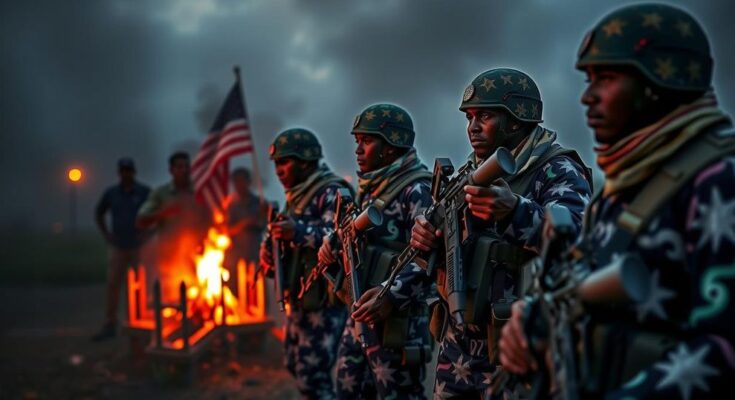Several hundred rebels in the Central African Republic have surrendered to government troops and U.N. forces, following an agreement with Chad to jointly secure their border. This action aims to facilitate upcoming local elections, previously postponed due to insecurity. Officials attribute the surrenders to food shortages exacerbated by military pressure from government forces.
On Wednesday, the Central African Republic (C.A.R.) reported the surrender of several hundred rebels, who turned over their weapons to government and U.N. forces. This move follows a recent agreement between C.A.R. and Chad to jointly protect their extensive 1,200-kilometer border. It is anticipated that local elections, initially postponed due to security concerns in October, will now proceed. C.A.R. authorities attribute these surrenders to relentless military pressure and worsening living conditions for the rebels in the region. Among the defectors was Mloubo Etienne, a 36-year-old former member of the Union for Peace (UPC) rebel group, one of C.A.R.’s most significant armed factions. In a state television interview, he lamented that growing hunger in the tropical forests near C.A.R.’s southern border had made survival untenable. His testimony suggests that similar conditions are prompting other UPC members along the northern border to consider surrendering, especially after Chad’s military cut off their vital food supplies. According to Maxime Balalou, the C.A.R.’s communication minister, a total of 105 fighters surrendered in Bambari, which is the nation’s third-largest city. This group included members from both the UPC and the anti-balaka factions. Balalou also noted significant disarmament activities in Kouango, where 36 fighters—including three women—laid down their arms. The government plans to facilitate the economic and social reintegration of these individuals through its Center for Disarmament, Demobilization, and Reintegration. The anti-balaka, a coalition of rebel factions emerging over the past decade, also continues to pose threats to stability. C.A.R. government operations aim to neutralize remaining rebel positions, thereby establishing a secure environment for upcoming elections—the first in 36 years. Originally scheduled for October, these elections have been rescheduled to December 29, pending favorable conditions. On October 23, officials from both C.A.R. and Chad convened in Bangui, agreeing to collaborate on a joint security initiative along their shared border. Chad has committed to deploying troops aimed at disrupting supply routes to C.A.R. rebel groups. The government of C.A.R. has issued a stark warning that any rebels who remain in hiding and fail to surrender may face lethal force from either government or U.N. troops, with a goal of disarming at least half of the estimated 21,000 rebels by the end of 2025.
The situation in the Central African Republic has been marked by prolonged civil unrest and the presence of numerous armed groups, with the UPC and anti-balaka being among the most prominent. Regional dynamics, particularly concerning Chad’s military efforts to curtail food supplies to these groups, have influenced the recent wave of surrenders. This context is crucial for understanding the government’s attempt to foster stability and prepare for upcoming local elections, which hold significant historical importance given their unprecedented nature in the last three decades.
The recent surrender of several hundred rebels in the Central African Republic marks a potential turning point in the country’s ongoing struggle for stability. Coordinated military efforts by C.A.R. and Chad, alongside humanitarian challenges faced by the rebels, appear to be significant factors in this development. As the government prepares for crucial local elections, the effective disarmament and reintegration of former combatants will be essential steps toward achieving lasting peace.
Original Source: www.voanews.com




